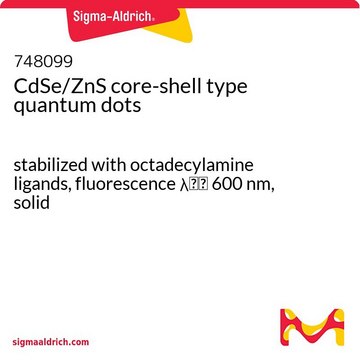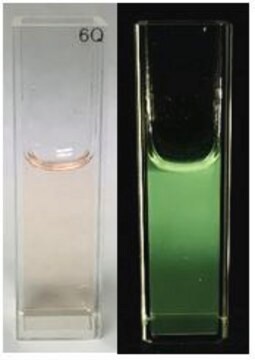776777
InP/ZnS quantum dots
stabilized with oleylamine ligands, fluorescence λem 620 nm, 5 mg/mL in toluene
동의어(들):
Cadmium free core shell quantum dots, Cadmium free quantum dots, Core/Shell heavy metal free quantum dots, Fluorescent nanocrystals
About This Item
추천 제품
유사한 제품을 찾으십니까? 방문 제품 비교 안내
관련 카테고리
애플리케이션
and the corresponding regulations worldwide makes these InP/ZnS quantum dots as more desirable alternatives for consumer applications.
기타 정보
신호어
Danger
Hazard Classifications
Aquatic Chronic 3 - Asp. Tox. 1 - Carc. 1B - Flam. Liq. 2 - Repr. 2 - Skin Irrit. 2 - STOT RE 1 - STOT RE 2 - STOT SE 3
표적 기관
Central nervous system, Lungs, Respiratory system
WGK
WGK 3
Flash Point (°F)
closed cup
Flash Point (°C)
closed cup
이미 열람한 고객
문서
Since the first report of the low-cost dye-sensitized solar cell (DSSC) in 1991 by Gratzel and his coworker,1 dye-sensitized solar cells (DSSC) has been regarded as one of the most promising photovoltaic technologies because of their transparent and colorful characteristics, as well as low cost.
Since the first report of the low-cost dye-sensitized solar cell (DSSC) in 1991 by Gratzel and his coworker,1 dye-sensitized solar cells (DSSC) has been regarded as one of the most promising photovoltaic technologies because of their transparent and colorful characteristics, as well as low cost.
Professor Sharma and colleagues review the synthesis and applications of this novel material. This includes a discussion of the unique properties of quantum dots and their suitability for solar cell applications, along with common synthesis techniques used to develop these materials.
Professor Xiaohu Gao (University of Washington, USA) provides a overview of recent quantum dot (QD) advancements and their potential for advancing bioassay and bioimaging technologies.
자사의 과학자팀은 생명 과학, 재료 과학, 화학 합성, 크로마토그래피, 분석 및 기타 많은 영역을 포함한 모든 과학 분야에 경험이 있습니다..
고객지원팀으로 연락바랍니다.









